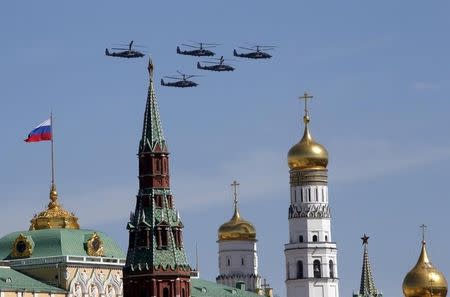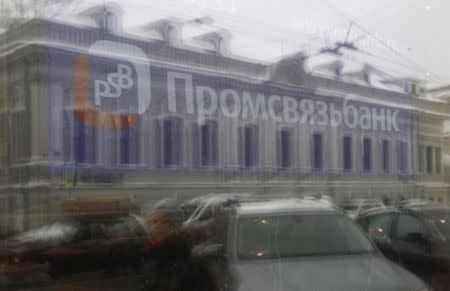Rise of new banks helps Kremlin keep Russia's economy afloat
By Oksana Kobzeva and Alexander Winning
MOSCOW (Reuters) - Four private banks with friendly ties with the Kremlin are emerging as big winners from Russia's economic crisis, helping out dollar-starved companies at a time when large state lenders are hampered by Western sanctions.
The four, FC Otkritie <OFCB.MM>, Promsvyazbank <PSBR.MM>, Credit Bank of Moscow <CBOM.MM> and B&N Bank [BINBK.UL], were relatively minor players only a few years ago.
Now they are major beneficiaries of a bank recapitalization plan and have used central bank foreign currency refinancing tools to win business lending to state energy firms and others needing to meet big overseas debt repayments.
By contrast, sanctions over the Ukraine conflict have closed international capital markets to state lenders such as Sberbank <SBER.MM>, VTB <VTBR.MM> and Gazprombank and private ones owned by allies of President Vladimir Putin such as Bank Rossiya.
The state banks are also unable to use foreign currency refinancing tools from the central bank for more than 30 days due to risks for Western clearing banks.
"Private banks are carving themselves out a position by increasing lending to large industrial companies, whereas they used to have to wait in a queue behind state banking giants," said Chris Weafer, senior partner at Macro Advisory consultancy.
"We are seeing the emergence of a new banking sector post-crisis," said Weafer, a long-serving financial analyst based in Moscow.
Otkritie, the only of the four lenders whose stock has been listed for some time and is liquid, has seen its shares rise 25 percent in the past year versus an 18 percent rise in the broader MICEX index <.MCX>.
Its assets, a reflection of its loan book, almost tripled to 2.7 trillion rubles ($41.3 billion) over the course of the year leading up to the end of June, Promsvyazbank's assets rose by 30 percent to 1 trillion rubles, Credit Bank of Moscow's by 60 percent to 760 billion rubles and B&N Bank's more than doubled to 570 billion rubles, data from Fitch Ratings showed.
Promsvyazbank said last year it had lent hundreds of millions of dollars each to oil producer Lukoil <LKOH.MM>, energy giant Rosneft <ROSN.MM> and potash producer Uralkali <URKA.MM> around the time of the sanctions.
STATE-FRIENDLY
The private banks' growth is especially striking because falling oil prices mean overall lending is contracting as the economy shrinks at the fastest pace since the 2008/09 global financial crisis.
"Large private banks have been used more and more as prime channels to finance strategic sectors as the large state banks have been sanctioned," said Vladimir Miklashevsky, trading strategist and economist at Danske Bank.
They have shared in the spoils from a large-scale bank recapitalization program costing the state over 800 billion rubles that was agreed late last year.
Otkritie received 65 billion rubles of OFZ government bonds in May, while Promsvyazbank got 30 billion rubles of the bonds in August, Credit Bank of Moscow received around 20 billion rubles of them in June and B&N Bank has been promised a further 9 billion rubles' worth, the banks and the government have said.
Otkritie alone saw the amount it borrowed under repurchase agreements (repos) with the central bank jump over eightfold to 695 billion rubles over the course of 2014, which allowed it in turn to ramp up lending to clients.
The repos were used to help state oil major Rosneft, run by a close ally of Putin, Igor Sechin, refinance large Western debts at the end of last and start of this year, according to an industry source and a banking source.
Anton Lopatin, an analyst at Fitch Ratings, said out of the roughly $32 billion the central bank had lent to Russian banks via forex repo operations, Otkritie owed about $18 billion.
Otkritie declined to reveal the size or limit of its foreign-currency refinancing operations with the central bank or comment on details of its lending to corporates, including Rosneft. It said it was willing to lend in foreign currency depending on its clients' financial condition.
Promsvyazbank and B&N Bank said they were prepared to lend in hard currency to companies with a large share of export revenue. Credit Bank of Moscow declined to comment.
With large debt repayments due from September, attention is turning to how Russian firms will be able to cope given that global capital markets remain frozen for them.
Analysts say private banks could once again help by giving loans to those scrambling for foreign currency. "The main criterion is that the bank should not be under sanctions and friendly to the state," Lopatin from Fitch said.
CONSOLIDATORS
The new rising stars in the banking sector differ from banks such as Bank Rossiya, which belong to some of the oldest and closest allies of Putin, businessmen Yuri Kovalchuk and Nikolai Shamalov. Bank Rossiya was referred to by the United States as "the personal bank for senior officials of the Russian Federation" when Washington imposed sanctions on Russia in 2014.
Oktritie Holding, which controls FC Otkritie, is co-owned by several bankers and industrial groups, all seen as loyal to the authorities but without particularly close ties with them.
They include bankers Vadim Belyayev and Ruben Aganbegyan, oil tycoons Leonid Fedun and businessman Leonid Mamut. A 10 percent stake in Oktritie Holding belongs to state bank VTB.
Promsvyazbank is majority owned by long-established bankers and brothers Dmitry and Alexei Ananyev, known for being close to the Russian Orthodox church.
B&N Bank is co-owned by oil businessmen Mikhail Gutseriyev and Mikhail Shishkhanov, while timber-to-sugar entrepreneur Roman Avdeyev is an owner of Credit Bank of Moscow.
As private banks ramp up lending and receive government support, they are also seeking to expand by snapping up rivals in Russia's overcrowded banking market.
Promsvyazbank said this month it had agreed to buy control in Vozrozhdenie <VZRZ.MM>, B&N Bank's shareholders are buying control in MDM Bank, while the owner of Credit Bank of Moscow is looking at buying into Uralsib <USBN.MM>.
The three targets were among the biggest private banks but were weakened by the 2008/09 financial crisis, as well as the current one.
(Editing by Dmitry Zhdannikov and Philippa Fletcher)

 Yahoo Finance
Yahoo Finance 

